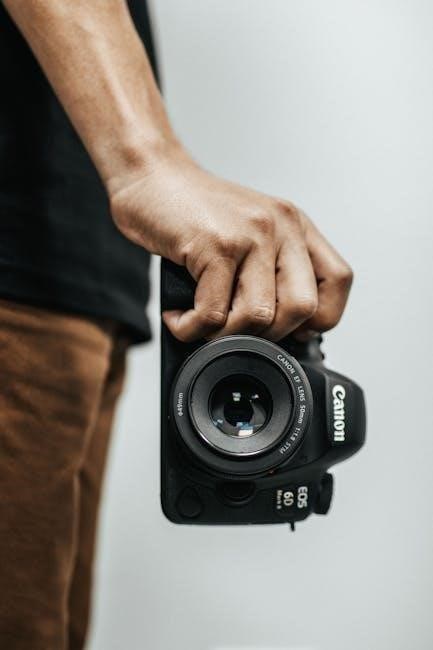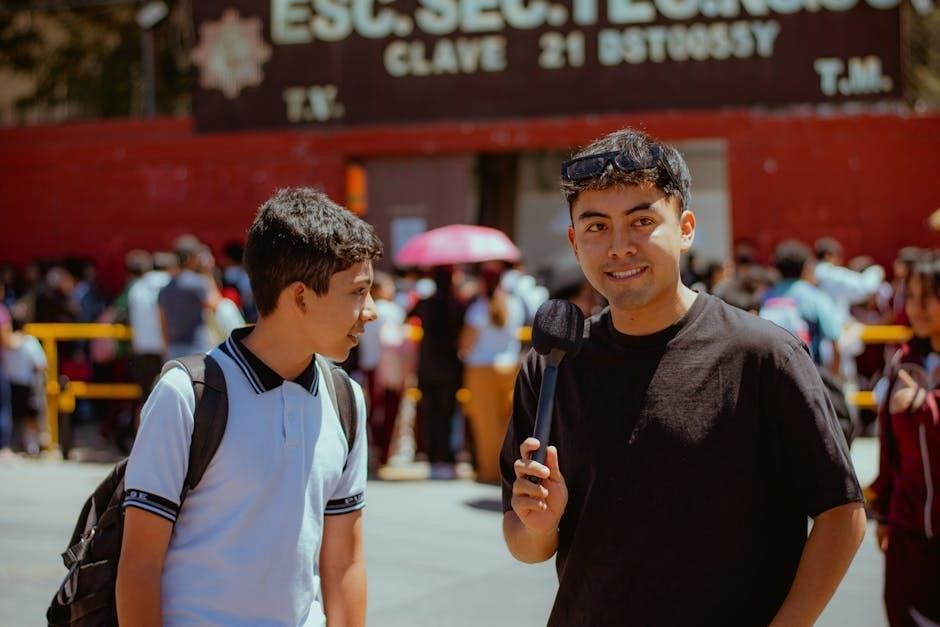f1 student visa interview questions and answers pdf
This guide provides essential insights into F1 student visa interviews, covering common questions, preparation tips, and strategies to ensure a successful application process in the United States.
Overview of the F1 Student Visa
The F1 student visa is a non-immigrant visa that allows international students to pursue academic studies in the United States. It is issued to students who have been accepted by a SEVP-approved institution and demonstrates their intent to study in the U.S. temporarily. To qualify, applicants must prove they have sufficient financial resources, academic qualifications, and strong ties to their home country. The visa process includes completing forms, attending an interview, and meeting specific eligibility criteria. Understanding the visa regulations and maintaining status is crucial for students to ensure compliance during their stay. This overview provides a foundational understanding of the F1 visa, helping applicants navigate the requirements and process effectively.
Importance of the Visa Interview
The F1 student visa interview is a critical step in the application process, allowing consular officers to assess an applicant’s eligibility and intentions. It ensures that students demonstrate clear academic goals, financial stability, and strong ties to their home country, reducing the risk of visa misuse. The interview also verifies the authenticity of documents and the applicant’s understanding of visa regulations. A successful interview confirms that the student intends to return home after completing their studies, aligning with the temporary nature of the F1 visa. Preparation is essential, as the outcome significantly impacts the ability to study in the U.S. This face-to-face interaction provides an opportunity for applicants to showcase their credibility and commitment to their academic pursuits. A well-prepared interview enhances the likelihood of approval, making it a pivotal moment in the visa process.
Common F1 Student Visa Interview Questions
Interviews often cover university choice, academic background, career goals, financial plans, post-graduation intentions, and family ties. These questions help assess eligibility and genuine intent to study in the U.S.
Questions About Choosing the University
Visa officers often ask why you selected a specific university or program. Be prepared to discuss factors like program reputation, faculty expertise, research opportunities, campus culture, and location. You may also be asked how the university aligns with your academic and career goals. It’s important to demonstrate thorough research and clear reasoning behind your choice. For example, mentioning specific courses, professors, or facilities that attract you shows genuine interest. Additionally, be ready to explain why you didn’t choose other universities or programs. Highlighting unique aspects of your chosen institution will help establish your intent to study in the U.S. and your commitment to your academic pursuits. Clarity and confidence in your answers will strengthen your credibility during the interview process.
Academic Background and Career Goals
Visa officers often inquire about your academic background and future career plans to assess your intentions and goals. Be ready to discuss your previous academic institutions, achievements, and how they have prepared you for your chosen program. You may be asked why you selected your specific major or field of study and how it aligns with your career aspirations. Questions like, “What courses did you take in your previous studies?” or “How will this degree help you achieve your career goals?” are common. Clearly connecting your academic choices to your professional ambitions demonstrates focus and purpose. Additionally, be prepared to explain how your skills and knowledge will benefit your home country or global opportunities. Showcasing a well-thought-out plan highlights your commitment to your education and future success.
Financial Planning and Sponsorship

Visa officers often ask detailed questions about your financial planning and sponsorship to ensure you can cover tuition, living expenses, and other costs while studying in the U.S. Be prepared to explain your funding sources, such as scholarships, personal savings, or family support. Questions like, “How will you fund your education?” or “Who is your sponsor?” are common. If you have a sponsor, provide documentation, such as bank statements or affidavits, to prove their financial commitment. Clearly outline your budget and how you plan to manage expenses without relying on unauthorized employment. Demonstrating a well-organized financial plan assures the visa officer of your ability to support yourself and comply with visa regulations. This is a critical aspect of showing your readiness to study in the U.S. without financial strain or dependencies.
Post-Graduation Plans
Visa officers often inquire about your plans after completing your studies to assess your intent to return to your home country. Be prepared to discuss your career goals, how your education aligns with them, and how you plan to apply your skills upon returning. Questions like, “What will you do after graduation?” or “Do you intend to work in your home country?” are common. Clearly articulate your vision, such as pursuing a job in your field, starting a business, or contributing to your country’s development. Avoid expressing intentions to remain in the U.S. or seek unauthorized employment. Demonstrating strong ties to your home country, such as family, cultural roots, or job offers, strengthens your case. A well-thought-out plan shows your commitment to returning home after completing your studies.
Family and Ties to Home Country
Questions about your family and ties to your home country are crucial to demonstrate your intent to return after completing your studies. Common questions include, “Do you have family in the U.S.?” or “Who will you be leaving behind?” Be honest and provide details about your family, such as their occupations or roles in your life. Highlighting strong ties, like dependents or financial responsibilities, can strengthen your case. Visa officers aim to ensure you have compelling reasons to return home after your studies. Emphasize your cultural roots, family obligations, or future plans that require you to be in your home country. Clear and heartfelt answers showcasing your commitment to returning will positively impact your visa approval chances.

Preparation Tips for the F1 Visa Interview
Research the university, practice answers, and maintain honesty. Understand visa requirements, stay calm, and ensure clarity in your responses to increase chances of a successful interview outcome.

Researching the University
Researching the university is a critical step in preparing for the F1 visa interview. Visa officers often ask detailed questions about the institution, such as its location, programs, faculty, and facilities. Students should be familiar with the university’s reputation, academic offerings, and campus culture. It is essential to understand how the chosen program aligns with their academic and career goals. Additionally, knowing specific courses, professors, and research opportunities can demonstrate genuine interest and preparedness. This knowledge not only helps in answering questions confidently but also shows the visa officer that the student has a clear understanding of their choices and intentions. Proper research ensures that the student can articulate why they selected the university and how it fits into their long-term plans, which is a key aspect of the interview process.
Practicing Answers
Practicing answers is a vital part of preparing for the F1 visa interview. Students should review common questions and craft clear, concise responses. Mock interviews with friends or mentors can help simulate the real experience, allowing students to refine their delivery. It is important to practice speaking confidently and maintaining eye contact, as these non-verbal cues convey sincerity. Additionally, students should avoid memorizing answers verbatim; instead, they should focus on understanding the questions and responding naturally. Practicing in front of a mirror or recording oneself can also provide valuable insights into body language and tone. Consistent practice ensures that students are well-prepared to address any questions posed by the visa officer, reducing nervousness and increasing the likelihood of a successful interview.
Honesty and Clarity
Honesty and clarity are crucial during the F1 visa interview. Visa officers are trained to detect dishonesty, so it is essential to provide truthful and transparent answers. Students should avoid exaggerating or misrepresenting facts about their academic background, financial situation, or future plans. Clarity ensures that the visa officer understands the student’s intentions and qualifications without ambiguity. For instance, when explaining why a particular university or program was chosen, the student should highlight specific factors like program reputation, faculty expertise, or research opportunities. Maintaining a balance between honesty and confidence helps build trust and demonstrates the student’s genuine intent to study in the U.S. Avoiding vague or overly complicated responses also makes the interview process smoother and more effective.

Top 10 F1 Visa Interview Questions to Prepare For
Why do you want to study in the United States?
Why did you choose this specific university or program?
What will you specialize in for your degree?
What are your reasons for choosing this course or program?
How will you finance your education and living expenses?
What are your plans after graduation?
Do you have any relatives or friends in the U.S.?
How do you plan to handle cultural differences in the U.S.?
Can you explain the gap in your academic or professional history?
Do you have any job offers or sponsorships after graduation?
These questions are designed to assess your intentions, financial stability, and ties to your home country. Preparing clear and concise answers is key to a successful interview.
Preparing thoroughly with these F1 visa interview questions and answers PDF ensures confidence and clarity, increasing your chances of a successful visa application for studying in the U.S;
Final Tips for Success
To excel in your F1 visa interview, stay calm, honest, and well-prepared. Research your university thoroughly and practice answering questions concisely. Be ready to discuss your academic goals, financial plans, and post-graduation intentions; Dress professionally and arrive early to make a positive impression. Avoid memorized answers; instead, speak naturally about your genuine plans. Highlight your ties to your home country to demonstrate intent to return after completing your studies. Show enthusiasm for your program and how it aligns with your future career aspirations. Most importantly, be confident and authentic, as sincerity plays a crucial role in a successful interview. By following these tips, you can increase your chances of securing your F1 student visa and achieving your educational goals in the U.S.